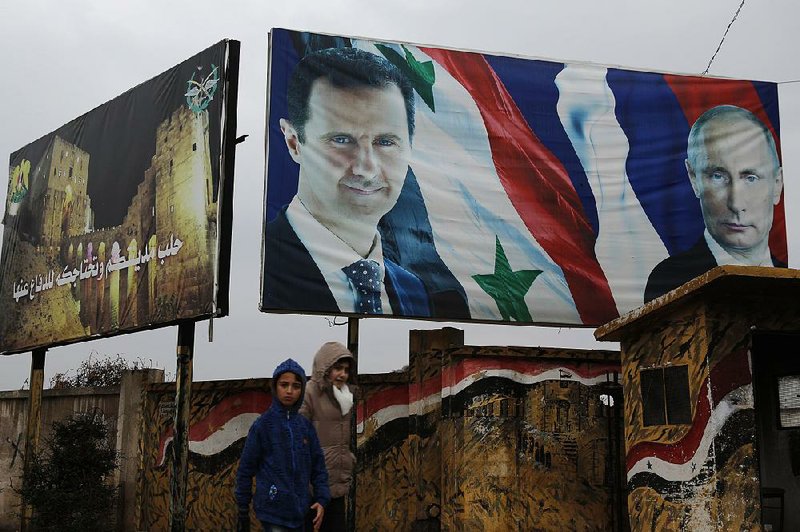BEIRUT -- Syria warned Thursday that its air defense will shoot down any Turkish jets that carry out attacks within Syria, as tensions soar over apparent preparations by the Turkish military to invade a northern Syrian Kurdish enclave.
From Damascus, Deputy Foreign Minister Faysal Mekdad said a military incursion into Syria's Kurdish-controlled enclave of Afrin would be "no picnic" for Turkey.
Any such operation would be considered an "aggressive act," Mekdad said.
The escalation comes after the United States disclosed plans to form a 30,000-strong border force in Syria led by the Kurdish-dominated Syrian Democratic Forces in the wake of the victory over the Islamic State extremist group. Turkey reacted angrily to the announcement.
Turkey regards the Syrian Kurdish militia that controls Afrin and other areas along its frontier as an extension of the Kurdish insurgency within its borders and wants to prevent the establishment of a Kurdish corridor along the frontier.
The U.S. has developed close ties with the Kurdish militia over the shared fight against the Islamic State, and it keeps bases in northeast Syria with the Kurds. But it is not believed to maintain any American forces in Afrin, an enclave that is not linked to the bulk of Kurdish-run territory in Syria.
Earlier Thursday, Turkish Prime Minister Binali Yildirim called on the U.S. to abandon ideas of a Syrian Kurdish border force, saying Washington has been inconsistent in its statements about its plans.
Turkish President Recep Tayyib Erdogan had called the U.S.-proposed force an "army of terror" and vowed to crush it. He said Turkey would launch a military offensive against the enclave of Afrin and other Syrian Kurdish militia-controlled territories and was massing troops and tanks on its border.
In Afrin, residents took to the streets to protest Turkey's threats, according to photos published by the Kurdish news agency Hawar. They waved flags of the Syrian Kurdish militia and banners of Abdullah Ocalan, the imprisoned leader of the outlawed Kurdistan Workers' Party, which Turkey considers a terrorist organization.
Mekdad, the Syrian deputy foreign minister, told reporters in Damascus that Syria's air force has been restored to its former might after seven years of civil war and was "ready to destroy Turkish air targets in the skies of the Syrian Arab Republic."
Syria's air force suffered a number of plane and helicopter losses in the government's war on opposition areas inside the country and the Islamic State. It has been unable to stop Israeli airstrikes against suspected Hezbollah targets within Syria.
U.S. Secretary of State Rex Tillerson told reporters Wednesday that the United States owes Turkey an explanation for saying it is supporting the creation of a border security force in northern Syria.
Tillerson said the "entire situation has been mis-portrayed, mis-described, some people misspoke. We are not creating a border security force at all." He said the U.S. intended to provide training to local elements in areas liberated from the Islamic State.
Turkish leaders were not satisfied. Yildirim said Turkey had received consecutive "statements that contradict each other within the past three days."
"The U.S. must eliminate the confusion and change its stance in favor of peace and improving relations with Turkey," he said during an address to police chiefs.
Asked about Tillerson's statement, Foreign Minister Mevlut Cavusoglu told Turkey's CNN-Turk television in an interview that "we are not satisfied" and that Ankara's mistrust of the U.S. is "continuing."
Washington had not kept to its promise to take back weapons it had supplied to the Syrian Kurdish militia fighting the Islamic State, he added. Turkey says the weapons frequently end up in the hands of outlawed Kurdish rebels fighting Turkey.
The Kurdish militia, which forms the backbone of the U.S.-backed Syrian Democratic Forces, now controls nearly 25 percent of Syrian territory. It was the U.S.-led coalition's chief ally in the war against the Islamic State in Syria.
Speaking at Stanford University in California, Tillerson also said the U.S. would step up its diplomatic efforts and push for broader political changes in Syria, roiled by war that has claimed up to a half-million lives since it broke out in 2011.
"Let us be clear, the United States will maintain a military presence in Syria focused on ensuring [the Islamic State] cannot re-emerge," Tillerson said.
Meanwhile Thursday, Turkey's chief of military staff and the head of its intelligence agency traveled to Russia, which has backed the government of Syrian President Bashar Assad in the civil war, for talks expected to touch on the possible Turkish offensive in Afrin. The Russian military is believed to have a presence there.
A Turkish military statement said Gen. Hulusi Akar and intelligence chief Hakan Fidan would meet with Russia's military chief, Valery Gerasimov, to discuss regional security matters, the latest developments in Syria and ongoing peace efforts for the war-torn country.
Information for this article was contributed by Matthew Pennington of The Associated Press.
A Section on 01/19/2018

